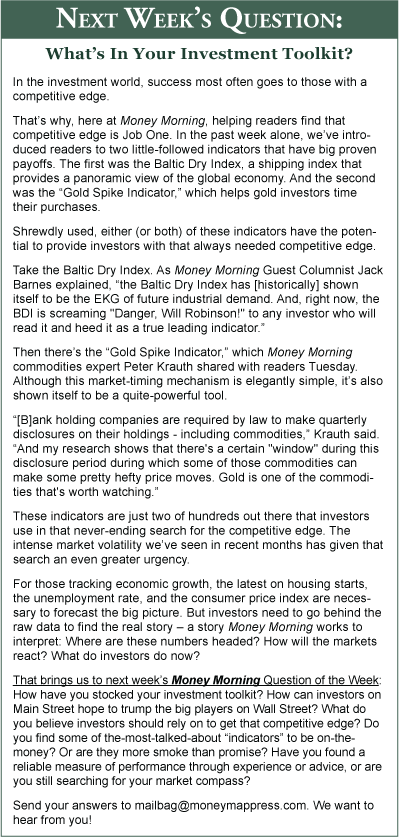More Americans than ever before are seeing their credit score slip to the subprime level, according to a new report released last week by credit-scoring firm Fair Isaac Corp. (NYSE: FICO). That means it's going to get a lot tougher for U.S. consumers to borrow money - especially given that banks are becoming more and more reluctant to lend.

"It's hard to see the good news in this report, unless you are speaking for the payday lenders, title lenders, and pawn stores," said John Ulzheimer, president of consumer education at Credit.com.
The FICO report shows that 25.5% of consumers - or nearly 43.4 million people - have a credit score below 600, putting them in the subprime realm. That makes them a high risk for lenders and means they'll have a tough time getting a credit card, mortgage or auto loan under stricter lending standards.
Another 9.5% of consumers have "fair" credit scores in the 600-649 range, which is still considered subprime. With "fair" scores, they're likely to need to seek loans, but may not be able to find them.
"More consumers falling into the lower part of the score distribution means that fewer consumers will qualify for new credit, [and] those that do qualify will likely not receive the best interest rates," said FICO spokesperson Rachel Bell.
Consumers are used to having a "Plan B" - an alternate strategy or personal escape plan intended as a means of compensating for over-borrowing or excessive spending. But since the financial crisis hit household income and asset value, credit card balances are way up and "Plan B" is long gone. Using the family home as a virtual ATM machine - and borrowing against the home equity - is no longer the option it was before.
"Now, there is no safety net," Ulzheimer said.
The measures consumers are now taking to remain afloat financially will carry a big cost later. When households begin to recover, they may want or need to borrow again, but tarnished credit scores will drastically limit their options - even excluding them from the credit markets.
Credit scores are calculated by taking into account payment history, amount owed, length of credit history, and types of credit extended. Reasons for slipping credit scores - late payments, high amount borrowed, newly extended loans - can be listed on a credit report for years depending on severity, affecting the borrower even if they have improved their financial standing.
"The reason why consumers have scores this low isn't because of a little bit of credit card debt you can write a check and erase," Ulzheimer said. "These are caused by negative information, which stays on a credit report for seven to ten years. This is not something that's going to go away in a year."
The damage is likely not over. It can take months for financial blunders to show up on a credit report. And with unemployment and foreclosures so high, many unfortunate consumers are still waiting for the credit-score storm to hit home.
Ulzheimer said lenders are beginning to make loans again, but are starting at the top, with the strongest-credit-score group and will eventually work their way down - meaning those with "fair" scores could end up waiting a long time for access to the borrowing markets.
While credit scores don't tell the whole picture, they are still a highly valued part of the lending process - maybe even overvalued now, according to some experts.
"The pendulum has swung too far," Ritch Workman, a Florida mortgage broker, told CNBC. "We absolutely swung way too far in the liberal lending, but did we have to swing so far back the other way?"
The new financial reform measures include a consumer-friendly clause allowing for a free credit score check after a would-be borrower is denied a loan or favorable rate due to their score. The goal is to make consumers more financially aware of where they are, where they need to be and how to get there.

This prompted last week's installment of Money Morning Question of the Week: Have you been monitoring your credit score? With loans now tougher to get, how are you changing your finances? Do you have a healthy credit score, or have you done some credit score damage you'll need to repair? What moves are you making, or how are you restructuring your personal or household finances since the financial meltdown? How important do you think it is to have a healthy credit score?
Here is a collection of reader responses: some regarding the credit score slump, others sent in previously regarding the U.S. lending market.
Redefining "Negative" For Profit
Just received a notice from Travelers Insurance [(NYSE: TRV)] saying that they had not given us their best rate for an automobile insurance policy because of our TransUnion credit score. It seems that our credit score is lower than we thought it should be because 18 months ago we got a credit card in our business name (associated with a personal social security number), always paid in full and on time.
Our mortgage to other credit ratio is low (less than 6% is a ding from TransUnion). The reason the mortgage to credit ratio is low is that we own two fully paid-for houses and two fully paid-for cars. We have no negatives on our report - all credit cards show never late.
But according to TransUnion and Travelers Insurance our credit score isn't the highest because we don't have a mortgage. Something is wrong with this picture. I suspect it is a way for insurance companies to justify charging higher rates.
- Alice
Credit Card "Pushers"
My credit score is over 800, and I have no debt. We live frugally, and sincerely intend to avoid getting into debt again for the rest of our lives, even if that means cutting back on lifestyle choices. I have two credit cards, both of which get paid off in full every month.
At the same time, I have sympathy for those who simply can't catch up to their debts, or who have been trapped in unemployment or with medical bills. Of special concern are our two sons, both of which are currently debt free, but who are just getting started out in life. It appears that the system is rigged to try to get our young people into debt as soon as possible, and keep them there for the rest of their lives.
A hundred years ago, our ancestors believed that debt was bondage, and I think perhaps they knew something that we have forgotten.
On the other hand, the way things are going, we may be about to learn this lesson again, as a nation and as individuals. Save then spend. Postpone gratification. Keep a cushion of savings in the bank (or under your mattress).
Look at the credit card offers that arrive in the mail the same way you would drug-pushers lurking in the alleys of run-down parts of town. We need to recognize that the people who keep extending us credit are not our friends, but instead see us as marks, to be enslaved and exploited.
- Gordon F.
Borrowing is the Economic Life Line
How can banks justify not giving out mortgage money in light of the fact that they can now qualify their applicants to a level before not seen? I am talking about literally millions of people applying for loans with 800 plus FICO scores and loan to value ratios that are better than ever before. How can banks and lending institutions take our money and then turn around and shut nearly everyone out... simply prolonging this recession?
Can anyone explain why the present administration and regulatory bodies are not forcing the banks to loan monies to qualified applicants?
At this rate, we will be dead soon. Without borrowing we will die.
- "Living in Costa Rica"
Stuck Between a Credit and Employment Crisis
My biggest concern is about banks giving out loans. I have a job making $100,000 in salary, but it's on a consulting basis because banks haven't been hiring full-time to keep their headcounts low - banks such as Bank of America [NYSE: BAC], Wells Fargo [NYSE: WFC], Credit Suisse [NYSE ADR: CS], and Citigroup [NYSE: C].
I can't get a loan since I need two years of 1099! I am willing to have a co-borrower to guarantee the loan yet I still can't get a loan where the payments will be less than my rent right now! How does this make sense and how can first time homebuyers buy a house?
- Haril P.
[Editor's Note: Thanks to all who responded to last week's installment of the Question of the Week feature regarding consumer credit scores. Be sure to answer next week's question: What's in your Investment Toolkit?
Send your answers to [email protected]!
Is there a topic you want to see covered as a Question of the Week feature? Then let us know by e-mailing Money Morning at [email protected]. Make sure to reference "question of the week suggestion" in the subject line. We reserve the right to edit responses for length, grammar and clarity.
Thanks to everyone who took the time to participate - via e-mail or by posting their comments directly on the Money Morning Web site.]
News and Related Story Links:
- CNBC:
More Americans' Credit Scores Sink to New Lows - CNBC:
Major Decline in Credit Scores Is Latest Blow to U.S. Recovery - Money Morning:
Washington Reaches Financial Reform Deal That Packs Lighter Punch Than Wall Street Had Feared - Money Morning News Archive:
Question of the Week Feature


